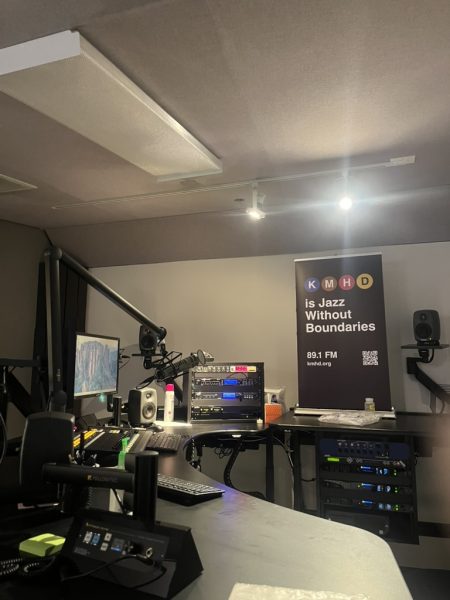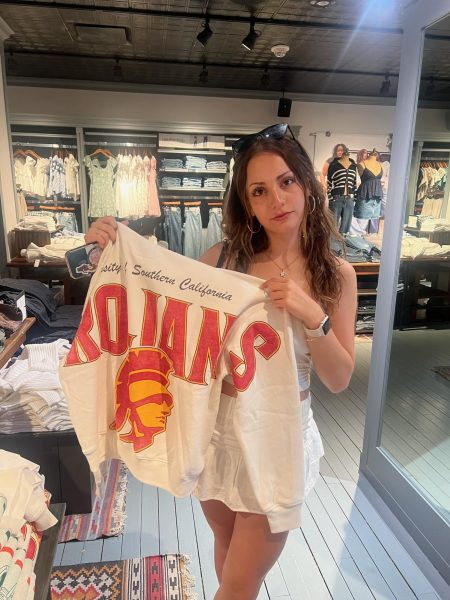
Jazz has been popular in Portland since as early as the 1930s, but it truly flourished after World War II; as the need for workers in the shipbuilding industry increased, so did Portland’s African-American population. Williams Avenue quickly became the center of the African-American community as former war-industry workers opened small businesses there. Due to racist animosity toward Black people settling in other parts of Portland, Williams Avenue and the Albina district suddenly became a bustling community, embellished with jazz.
Throughout the 1940s, jazz clubs and venues began popping up. These stayed open around the clock to provide people with a place to stay and to help with the congestion in the region. Soon, well-known jazz artists from throughout the country were making stops in Portland on their way to other locations. Nearly 40 years later, Portland’s beloved jazz station, KMHD — which began at Mt. Hood Community College — has continued to carry on the lavish history of jazz in the area.
Now, KMHD is located at Oregon Public Broadcasting (OPB), where they are able to run a listener-supported, non-profit 24-hour jazz and blues station. In 2020, KMHD was selected by the Doris Duke Foundation as one of five stations across the nation to receive an up to $275,000 grant, allowing them to hire more full-time employees and continue to air the shows they do now. Day to day, KMHD embraces their slogan, “Jazz Without Boundaries,” through their usual programming and guest producer shows. The station is committed to both widening and examining the definition of the genre as they continue to work with all kinds of sounds that stem from jazz.
Bri Drennon, host of “Takin’ Off” — the Monday through Thursday drivetime show from 4 to 6 p.m. — believes the success and longevity of the station is attributable to “[their] global audience.” Drennon adds, “That growth has really happened since we came to OPB.” She continues, “One of the reasons KMHD is so successful is because we don’t gatekeep music. We’re not telling you what is jazz and what isn’t jazz. We respect that this art form has given birth to a million different sounds and various interpretations.”
Drennon emphasizes the importance of jazz, explaining that “jazz informs every other music that we think of as [popular American] music today.” She focuses on catering her show so that her audience feels good. “My role is to celebrate Black genius,” she adds.
Alex Newman, host of “The New Format,” which airs Monday through Friday from 11 a.m. to 1 p.m., sees his show as “[his] personal expression of what Jazz Without Boundaries is.” When it comes to the station blending classic jazz and contemporary artists and developments, they work to search for connections between the past and present. “The dots are all there and I think we find a lot of joy [in] finding ways to connect those dots for our listeners and ourselves,” Newman highlights.
A regular day at KMHD is versatile and always depends on what each host has lined up — whether that be interviews, pre-recordings, or sessions jamming along with listeners. Drennon adds, “Unless I have meetings I’m working around, for the most part, I spend a couple hours prepping for my show, pulling songs, [and] trying to find things that are interesting.” As technology continues to advance, the options for radio have become vast, allowing hosts to pre-record their shows and listeners to stream on-demand.
Radio has survived so many emerging mediums throughout the decades, and Newman believes that “the future for radio is surprisingly bright. Time has shown that there is something special about the experience of hearing music presented on the airwaves.”
Bryson Wallace, social media manager at KMHD and radio host of “Positive Vibrations,” — which airs Monday through Friday from 10 to 11 a.m. and weekends from 10 a.m. to noon — works to spread the net of outreach for the station through the internet and graphic design. A friend recommended that Wallace look into a position at the station, and, now, he states, “It’s an awesome role that makes me feel fulfilled to share the music!” Wallace formed his show as an audio pep talk for someone’s day, and he has found that the bold selections and an overall mix can give the audience the energy to get through their day and week.
Wallace states, “Being live in the studio is an electricity for me.” He continues, “I get joy from knowing the vinyl I play is going around the world and invigorating my community.” Drennon also loves the rush of playing music to a wide audience. “Being a radio DJ for me is all about being on the air and being live. The key thing for me is I don’t hit play and walk out of the room.” She adds, “If you’re listening to the radio and you hear me sound a little out of breath, it’s because I was dancing in the booth to the music.”
KMHD incorporates sounds from across the globe, including Latin American rhythms, Ghanaian funk, and even Turkish psychedelia. Wallace states that for his show, “I can go all over the world through sound in a single set, and I believe that’s revolutionary for the listener to experience.” KMHD also hosts musicians from around the world, interviewing them about their careers and passion for music. Newman hosted Brian Jackson, an American musician and producer, and it was “the most amazing moment of [his] radio life so far.” Newman continues, “[Jackson] was so open and engaged. It was truly an honor and extremely surreal to hang with him and enjoy music from his storied career with our audience.
The station collaborates with local musicians, promoters, and other people in the music industry to have conversations about their music and events, both on and off the air. Newman mentions how they try to support the local scene by “playing the music of local musicians and highlighting visiting artists to get [their] audience excited about seeing them in person.” Wallace agrees, “Getting the word out is essential for allowing these musicians to play for a more interested and present audience around the area.”
As the station plays so many variations and interpretations of jazz, Drennon recognizes that she can’t always please every listener. However, she explains, “If we give people a mix, they’re going to hear enough of what they like.” Drennon also prefers to “let [the] music speak for itself” and to spend her time listening along with her audience.
Portland’s abundant history of jazz — centered around a community that came together in times of oppression through music and the empowerment it provided them — will never be forgotten. Another group working to restore what once was Oregon’s largest Black community — those living in the Albina district — is the Albina Music Trust, the only full-service community archive in the United States. Their various programs expand the legacy of Albina’s musician population via media preservation, events and exhibitions, oral history, publications, and a sound walk.
In addition to all of these programs, they have a radio program through KMHD called “The Archive,” hosted by Bobby Smith. It explores historic regional music with a focus on pre-internet sounds of jazz and soul music in Portland. The Albina Music Trust continues to collaborate with community members as well as civic and cultural organizations, stating on their website that they are “the stewards of a digital repository documenting Albina’s arts and culture legacy, the Albina Community Archive.”
The work both Albina Music Trust and KMHD are doing to carry on the legacy of the Albina community is extremely important, as it was under threat due to historic systems of oppression, such as redlining, civic disinvestment, and gentrification.
The future of KMHD is bright; this is seen in the station full of people passionate about jazz and the experience of playing music on the radio. Wallace has found that being on KMHD “has shown [him] that the future of radio is bright if we are just daring enough to stray from the status quo and confidently be authentic in the music selection.”
“I think our excitement around discovering music — new and old — positions KMHD uniquely to be on the forefront,” Newman states. Music has always been an expression of the time, human experiences, and art. Drennon adds, “Jazz is a universal language. Music is a universal language.”

































